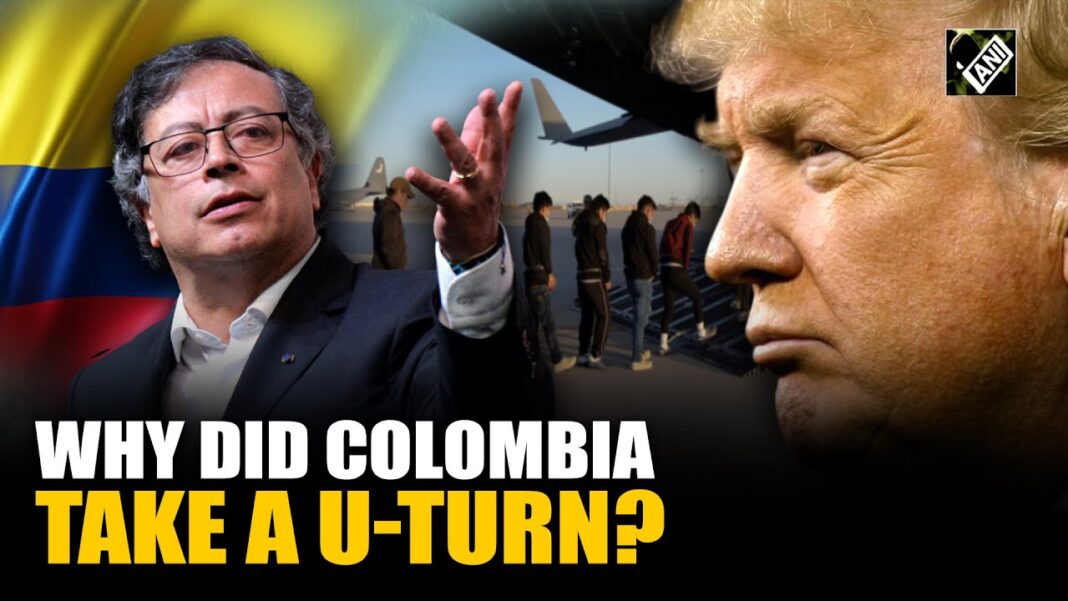|
Getting your Trinity Audio player ready...
|
Colombian President Gustavo Petro Reverses Course on Deportation Flights After Trump Threatens Tariffs
Edited by: TJVNews.com
In a dramatic series of events, Colombian President Gustavo Petro abruptly changed his stance on accepting deportation flights from the United States following a stern warning from former President Donald Trump. According to a report that appeared on Sunday in The New York Post, Trump threatened to impose emergency tariffs of up to 50% on Colombian imports if the South American leader continued to refuse cooperation.
Initially, Petro resisted accepting deported Colombian migrants from the U.S., condemning the Trump administration’s approach as one that treated deportees like “criminals.” He called on the U.S. to implement protocols ensuring the dignified treatment of migrants before Colombia would agree to receive its nationals. However, The New York Post reported that after Trump swiftly retaliated by enacting a 25% tariff on Colombian goods, with a promise to double the figure within a week, Petro not only conceded but went a step further, offering the official Colombian presidential plane to assist in the deportations. Petro’s government described the gesture as a demonstration of Colombia’s “commitment to guarantee decent conditions” for the returning citizens, The New York Post reported.
The conflict arose over the weekend when the U.S. initiated military flights carrying deported Colombian migrants as part of Trump’s crackdown on illegal immigration. The first wave of deportations focused on individuals with criminal records and deportation orders. Despite initially authorizing the flights, Petro reportedly revoked his authorization while the planes were en route, leading to a tense standoff between the two nations. Secretary of State Marco Rubio accused Petro of backtracking on his commitments, stating on X (formerly Twitter) that the Colombian president had “canceled his authorization” for the flights at the last minute. Rubio further emphasized the U.S.’s resolve to combat illegal immigration and strengthen border security, according to the information provided in The New York Post report.
Trump’s response was swift and forceful. In addition to imposing tariffs, the State Department suspended visa processing at the U.S. Embassy in Bogotá, citing Petro’s refusal to accept repatriation flights as the reason. “These measures are just the beginning,” Trump warned, asserting that the Colombian government had a legal obligation to accept its citizens who were being deported. He added that the U.S. would not tolerate Colombia’s failure to uphold its responsibilities, the report in The New York Post detailed.
Petro’s reversal drew attention to the leverage wielded by the Trump administration in enforcing its immigration agenda. The New York Post report noted that Trump’s use of economic penalties and diplomatic measures, such as suspending visa processing, demonstrated his administration’s resolve in addressing illegal immigration. Meanwhile, Petro’s initial resistance and subsequent capitulation highlight the complexities of balancing domestic political considerations with international pressures.
The episode also raises broader questions about the treatment of deported migrants and the protocols governing their return. Petro’s insistence on dignified treatment for deportees shines a spotlight on the challenges faced by nations required to accept their nationals under often-contentious circumstances. At the same time, Trump’s uncompromising approach reflects his administration’s broader strategy of leveraging economic and diplomatic tools to enforce immigration laws, as detailed by The New York Post.
Ultimately, the swift resolution of this standoff serves as a stark reminder of the power dynamics in U.S.-Colombian relations and the political stakes involved in addressing the global issue of migration. Both leaders sought to assert their respective priorities, but it was Trump’s economic threats that ultimately forced Petro’s hand.





